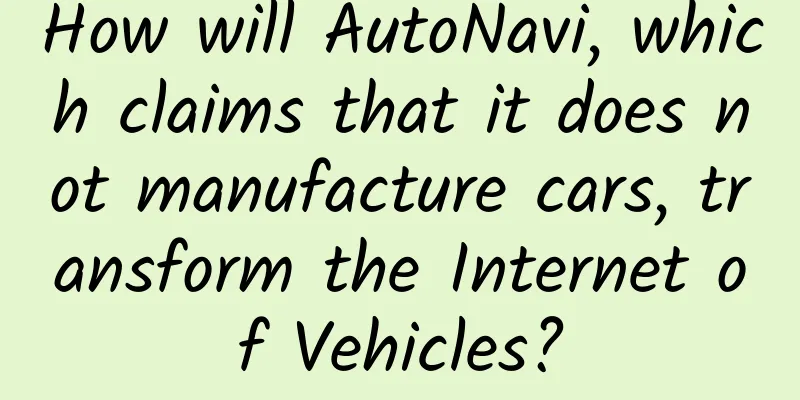The "money prospects" of the Internet of Vehicles attract giants to compete for the rapid development of intelligent connected vehicles

|
Recently, the Ministry of Industry and Information Technology and the National Standards Committee jointly issued the "Guidelines for the Construction of a National Internet of Vehicles Industry Standard System", proposing to basically complete the construction of a national Internet of Vehicles industry standard system by 2020. With the gradual unification of communication standards and the rapid improvement of technology, smart connected cars are entering a stage of accelerated development. A report predicts that the compound annual growth rate of the Internet of Vehicles field will reach 22.9% from 2016 to 2021, and it will be the fastest growing market in the field of Internet of Things. At present, Huawei, Baidu, Alibaba, Tencent and many listed companies have accelerated their layout in it. Among them, Huawei's strategic committee has made it clear that the Internet of Vehicles is a high-value industry and it wants to make the Internet of Vehicles the world's number one. Give cars a smart brain Low-carbon energy, electrification of power, lightweight body, intelligent vehicle, transportation networking, and shared use are the major trends in the development of the automotive ecosystem. Among them, the development of intelligent and networked vehicles is likely to surpass electrification of power. In simple terms, intelligent networking will give cars a smart "brain" with complex environmental perception, intelligent decision-making, coordinated control and execution functions, enabling safe, comfortable, energy-saving, efficient driving, and automatic driving. How to equip cars with such a smart brain is not only a matter of vehicle manufacturers, but also a large number of Internet and communication technology companies, which have invested in the field of intelligent networking of cars. According to incomplete statistics, the total financing amount in the field of intelligent connected vehicles exceeded 40 billion yuan in 2017. Behind this is the huge market prospect of the Internet of Vehicles. The latest report of ICInsights, an international market research organization, pointed out that the total output value of the Internet of Things market will reach 93.9 billion US dollars this year, among which the Internet of Vehicles market will have the highest growth rate, which is expected to increase by 21.6% to 4.5 billion US dollars. According to another market research firm, BIIntelligence, by 2020, the global market share of connected cars will reach 380 million units, and global sales of connected cars will increase from 21 million units in 2016 to 94 million units, accounting for 82% of the market. Between 2015 and 2020, the global Internet of Vehicles industry will generate US$8.1 trillion in revenue. Rapid development of intelligent networking Recently, Huawei, a global communications manufacturing giant, released the OceanConnect Internet of Vehicles platform at the CEBIT 2018 exhibition in Germany, which is committed to the intelligent networking of vehicles, the service-oriented transformation of automakers, and the intelligent evolution of transportation. It is understood that Huawei's Strategic Committee issued a document in April this year that mentioned Huawei's multiple business strategic priorities in 2018, among which the Internet of Vehicles was mentioned as the first item; the document clearly stated that the Internet of Vehicles is a high-value industry and that the layout should be accelerated. The goal is simple and clear: to make the Internet of Vehicles the world's number one. Xiong Wei, president of Huawei's LTE product line, also revealed that in 2018, Huawei will provide Internet of Vehicles-related solutions for 100,000 connected vehicles. At the just concluded 2018 Asia CES, the internet company Baidu announced the official launch of Apollo 2.0 and officially opened it to users. Baidu Apollo 2.0 is a complete set of autonomous driving solutions that can achieve autonomous driving on simple urban roads. It is reported that in addition to large domestic vehicle manufacturers such as Changan Automobile Group and FAW Group, about 100 companies including European and American auto giants such as Ford and Daimler and technology giants such as Nvidia and Intel have also joined the plan. At the same time, Japan's Honda and South Korea's Hyundai also announced that they would join Baidu's autonomous driving development alliance. As for listed companies, SAIC Motor announced its cooperation with Alibaba Cloud in early June to launch the industry's first hybrid cloud automotive R&D simulation computing service platform "SAIC Simulation Computing Cloud SSCC" to improve automotive R&D efficiency and enhance the connectivity, automation and intelligence of R&D processes through cloud computing. Looking further ahead, on May 24, GAC Research Institute and Tencent Cloud reached a cooperation agreement, and the two parties will conduct in-depth cooperation in the fields of overall Internet of Vehicles solutions and big data cloud. Since entering the field of Internet of Vehicles, Xingmin Zhitong has promoted the all-round layout of "car machine - T-Box - Internet of Vehicles data operation service" with "Internet of Vehicles data operation service" as the core, forming an intelligent networked car industry chain with Intest hardware and software products and 95 Intelligent Driving data operation service as the core. Luchang Technology has successively reached strategic cooperation with Internet giants such as Tencent, Baidu, and Alibaba to jointly promote the development of Internet of Vehicles and intelligent automobiles. Establish vehicle networking standards by 2020 The "Guidelines" are divided into several parts, including overall requirements, intelligent connected vehicles, information and communications, electronic products and services, etc., among which the intelligent connected vehicles part was issued at the end of 2017. The Guidelines point out that it is necessary to speed up the formulation of common basic standards, step up the development of standards related to autonomous driving and assisted driving, key technical standards for vehicle-mounted electronic products, key technical standards for wireless communications, and key technical standards for the Internet of Vehicles industry to meet the needs of industrial development. By 2020, the national Internet of Vehicles industry standard system will be basically established. The standard system for intelligent connected vehicles mainly clarifies basic directions such as definition and classification, general specifications such as human-machine interface, functional safety and evaluation, and standards related to product and technology applications such as environmental perception, decision-making and warning, auxiliary control, automatic control, and information interaction. The information and communication standard system is mainly designed for the information and communication technology, network and equipment, and application services of the Internet of Vehicles, focusing on the research of the new generation of information and communication technology to support the key direction of the development of Internet of Vehicles applications. The key standards involving information and communication in the Internet of Vehicles industry are supported by common basic technologies and information and communication security technologies, and the system architecture is divided into three levels in the way of "end-pipe-cloud", namely, the perception layer (end), the network layer (pipe), and the application layer (cloud). The electronic product and service standard system clarifies the standardization development direction of Internet of Vehicles electronic products and in-vehicle information services. Internet of Vehicles electronic products and services include basic products, terminals, networks, platforms and services, etc. Through basic products and terminals, the intelligent information of vehicles is collected and obtained to realize services such as traffic information, navigation services, entertainment information, safe driving, online business, emission information, and remote control. Relevant personnel from the Science and Technology Department of the Ministry of Industry and Information Technology said that the "Guidelines" will give full play to the top-level design and basic leading role of standards in the construction of the ecological environment of the Internet of Vehicles industry. Industry insiders pointed out that with the gradual unification of communication standards and the rapid improvement of technology, the application conditions of the Internet of Vehicles are becoming more mature, and the intelligent network industry is expected to enter the fast lane of development. As a winner of Toutiao's Qingyun Plan and Baijiahao's Bai+ Plan, the 2019 Baidu Digital Author of the Year, the Baijiahao's Most Popular Author in the Technology Field, the 2019 Sogou Technology and Culture Author, and the 2021 Baijiahao Quarterly Influential Creator, he has won many awards, including the 2013 Sohu Best Industry Media Person, the 2015 China New Media Entrepreneurship Competition Beijing Third Place, the 2015 Guangmang Experience Award, the 2015 China New Media Entrepreneurship Competition Finals Third Place, and the 2018 Baidu Dynamic Annual Powerful Celebrity. |
<<: Even Huawei is in trouble. It is really difficult for domestic mobile phones to "go global".
>>: Youxia Motors cooperates with IDG and PRODRIVE to establish an overseas joint R&D center
Recommend
If you are bitten by a five-step snake, is it okay to take four steps?
Ding ding ding ~ Fantastic beasts are coming! Tad...
This disease with a mortality rate of nearly 100% is hidden around you and me, but many people don’t know it.
Today is rabies day, let’s talk about it seriousl...
What do you know about the fig’s “fruit without flowers”?
"It has no gorgeous flowers, but it has swee...
The first comet carrying a human probe flies to Earth: The next one will take 200 years
On November 12, 2021, a comet carrying a human pr...
How does this content sharing community achieve user growth?
Using Jianshu V2.11.2, draw the product structure...
Why is it unsafe to use power banks on the subway?
Guangzhou Metro recently proposed that "passe...
After spending money, how can we judge the effectiveness of promotion?
You know that half of your advertising budget is ...
How to write a company celebration event planning proposal? Six aspects need to be grasped
2019 is coming to an end and 2020 is about to arr...
Android Aiyouman v2.1.3 All comics free to read_Taoduoduo
Android Aiyouman v2.1.3 All comics free to read_T...
"Father of Android" Rubin: A man that Jobs regarded as a thorn in his side
[[122073]] Far away in Mountain View, California,...
With an efficiency of 75%, the photography industry can double the click-through rate of information flow advertising by doing this!
As costume photography is sought after by more an...
From mid-to-late stage lung cancer to successful anti-cancer treatment, this doctor has been actively fighting cancer for 9 years and summed up these 6 points
Many people are afraid of cancer and think that i...
After eating "Umbrella", the thread was pulled out and it became a hot topic online! Don't eat these things casually, they can be fatal if you are not careful
today #A woman had hallucinations after eating wi...
Taichi iOS 8.4 for Mac is now jailbroken
Taiji jailbreak team finally released the iOS 8.4...
What problems does the monthly card function launched by ofo solve?
Currently, there are three entrances to ofo’s bik...









